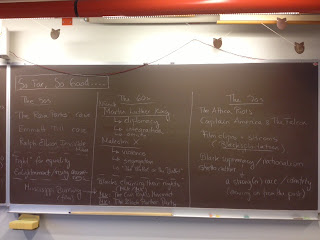Til denne
lektions referent:
Use these
headlines to help you writing a few notes on today’s lesson. Upload your notes
to the class blog before the next lesson.
Texts we have worked with today (homework and
texts introduced in class)
“The Free
Radio” by Salman Rushdie
A Danish article from Kristeligt Dagblad: Efter møde med Gandi: Jeg har fundet min
styrke i enkelheden
How did we work with these texts?
We worked
with the short story in pairs
We finished making the literary analysis of the text “The Free Radio” that we started in the last lesson
We finished making the literary analysis of the text “The Free Radio” that we started in the last lesson
We started
a translation exercise with the article
- reading the text and translating the red part of the text
- reading the text and translating the red part of the text
What were the main topics of today’s lesson?
The meeting
between the old and the modern India
India’s meeting
with the western world
What did we discuss?
Literary
Analysis:
Setting:
- India: town (small), old India>< Bombay = far-away city, expensive, modern India
- Takes place in the 70's: Youth movement, sterilisation, "State of Emergency"
- Social conditions: poor, language (not proper education)
- Mood: dark, sad, negative (at first at least)
- India: town (small), old India>< Bombay = far-away city, expensive, modern India
- Takes place in the 70's: Youth movement, sterilisation, "State of Emergency"
- Social conditions: poor, language (not proper education)
- Mood: dark, sad, negative (at first at least)
Plot/conflict:
- The story revolves around a young man named Ramani
- The white caravan (entices the population into sterilisation)
- Ramani's attack on the men in the van - he realizes the fraud, he loses his trust in the government
- The story revolves around a young man named Ramani
- The white caravan (entices the population into sterilisation)
- Ramani's attack on the men in the van - he realizes the fraud, he loses his trust in the government
Characters:
Ramani:
- a young naive man
- epiphany - doesn't get the radio
- round character (complex, different emotions, development)
- a young naive man
- epiphany - doesn't get the radio
- round character (complex, different emotions, development)
The narrator (point of view):
- old man, retired teacher, 1st person narrator, conservative (old values), feels responsibility (honour, culture, tradition)
- interacts with Ramani and the thief's widow
- doesn't approve of modern tendencies/youth
- old man, retired teacher, 1st person narrator, conservative (old values), feels responsibility (honour, culture, tradition)
- interacts with Ramani and the thief's widow
- doesn't approve of modern tendencies/youth
The thief's widow:
- the name = government (India divorced from India) --> Modern India/representative of western moral >< old man = old culture
- thief: stealing
- physical characteristics: beautiful on the outside/rotten on the inside, poor, greedy
- the name = government (India divorced from India) --> Modern India/representative of western moral >< old man = old culture
- thief: stealing
- physical characteristics: beautiful on the outside/rotten on the inside, poor, greedy
Theme:
- Meeting between cultures
- Old vs. New
- Governmental abusement of power
- Meeting between cultures
- Old vs. New
- Governmental abusement of power
Anything else?
Not really



